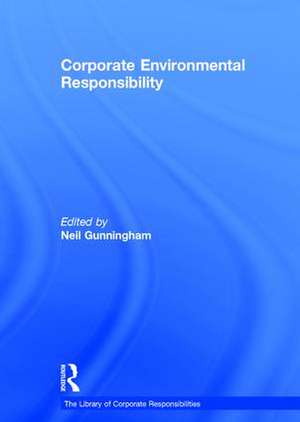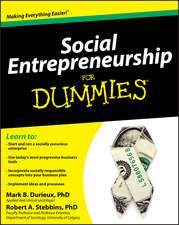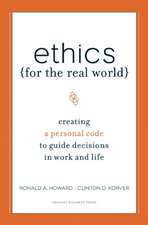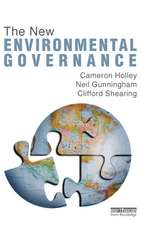Corporate Environmental Responsibility: The Library of Corporate Responsibilities
Editat de Neil Gunninghamen Limba Engleză Hardback – 20 noi 2009
Preț: 1978.23 lei
Preț vechi: 2657.73 lei
-26% Nou
Puncte Express: 2967
Preț estimativ în valută:
378.57€ • 392.84$ • 316.43£
378.57€ • 392.84$ • 316.43£
Carte tipărită la comandă
Livrare economică 17-31 martie
Preluare comenzi: 021 569.72.76
Specificații
ISBN-13: 9780754628248
ISBN-10: 0754628248
Pagini: 628
Dimensiuni: 169 x 244 x 47 mm
Greutate: 1.41 kg
Ediția:1
Editura: Taylor & Francis
Colecția Routledge
Seria The Library of Corporate Responsibilities
Locul publicării:Oxford, United Kingdom
ISBN-10: 0754628248
Pagini: 628
Dimensiuni: 169 x 244 x 47 mm
Greutate: 1.41 kg
Ediția:1
Editura: Taylor & Francis
Colecția Routledge
Seria The Library of Corporate Responsibilities
Locul publicării:Oxford, United Kingdom
Cuprins
Contents: Introduction; Part I The Development of CER: the First-Generation Debates: A road map for natural capitalism, Amory B. Lovins, L. Hunter Lovins and Paul Hawken; A natural-resource-based view of the firm, Stuart L. Hart; Green and competitive: ending the stalemate, Michael E. Porter and Claas van der Linde; Toward a new conception of the environment-competitiveness relationship, Michael E Porter and Claas van der Linde; Ecological modernisation, ecological modernities, Peter Christoff; Towards the sustainable corporation: win-win-win business strategies for sustainable development, John Elkington; It's not easy being green, Noah Walley and Bradley Whitehead. Part II Second-Generation CER: Beyond the Win-Win-Win/Win-Lose Dichotomy: When pollution prevention meets the bottom line, Linda Greer and Christopher van Löben Sels; Environmental product differentiation: implications for corporate strategy, Forest L. Reinhardt; Market failure and the environmental policies of firms: economic rationales for 'beyond compliance' behavior, Forest Reinhardt; Is there a market for virtue? The business case for corporate social responsibility, David J. Vogel; Beyond the business case for corporate sustainability, Thomas Dyllick and Kai Hockerts; Strategy and society: the link between competitive advantage and corporate social responsibility, Michael E. Porter and Mark R. Kramer. Part III Ethics, Altruism and the Business Case for CER: Corporate social responsibility: an economic and public policy perspective, Paul R. Portney; The 4 faces of corporate citizenship, Archie B. Carroll; When it hits the fan, Edmund M. Burke; Environmental visibility: a trigger of green organizational response, Frances E. Bowen. Part IV How Real is CER? What the Evidence Tells Us: Why do firms adopt 'beyond compliance' environmental policies?, Aseem Prakash; Does it really pay to be green? An empirical study of firm environmental and financial performance, Andrew A. King and Michael J. Lenox; Developing environmental management strategies, Nigel Roome; Extending linear approaches to mapping corporate environmental behaviour, A. Ghobadian, H. Viney, J. Lui and P. James; Hitting the green wall, Robert D. Shelton. Part V Explaining Variation in CER: The meaning of greening: a plea for an organizational theory, Thomas N. Gladwin; The greening of the board room: how German companies are dealing with environmental issues, Ulrich Steger; Policy networks and firm behaviours: governance systems and firm responses to external demands for sustainable forest management, Benjamin Cashore and Ilan Vertinsky; Stage models of corporate 'greening': a critical evaluation, Anja Schaefer and Brian Harvey; The myth of best practices: the context dependence of 2 high-performing waste reduction programs, Peter B. Cebon. Part VI Towards an Interactive Model of CER: Social license and environmental protection: why businesses go beyond compliance, Neil Gunningham. Robert A. Kagan and Dorothy Thornton; Managerial interpretations and organizational context as predictors of corporate choice of environmental strategy, Sanjay Sharma; The new corporate social responsibility, Graeme Auld, Steven Bernstein and Benjamin Cashore; Globalization and the environment: strategies for international voluntary environmental initiatives, Petra Christmann and Glen Taylor; Name index.
Notă biografică
Neil Gunningham is a Professor at the Fenner School of Environment and Society and the Regulatory Institutions Network at the the Australian National University, Australia and Distinguised Research Professor at the University of Cardiff, Wales. His previous books include Smart Regulation (with Grabosky), Leaders and Laggards:Next Generation Environmental Regulation (with Sinclair) and Shades of Green: Business, Regulation and Environment (with Kagan and Thornton).
Descriere
The essays in this volume map the development of the Corporate Environmental Responsibility (CER) concept, trace the principal debates concerning its contribution to environmental protection, assess the evidence as to what extent corporations are seeking to 'do well by doing good' and explain why some companies have gone down this path when others, similarly situated, have been unwilling to do so. In essence it asks: what has CER accomplished, what can it accomplish and what is beyond its reach.












